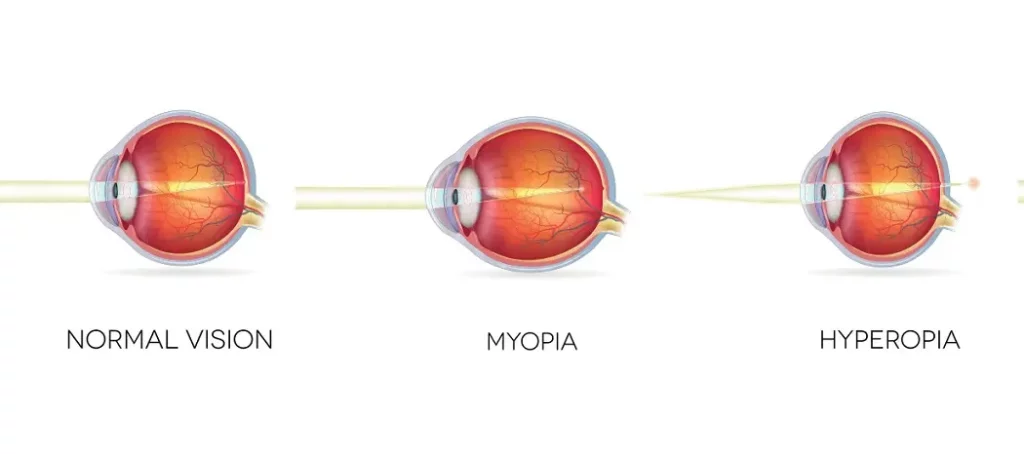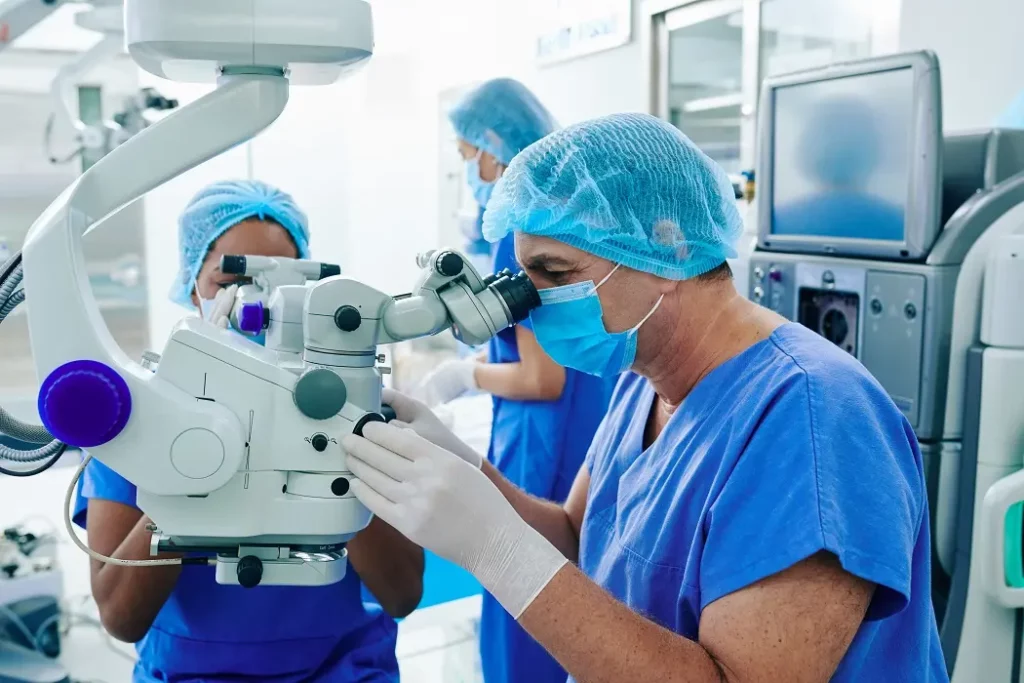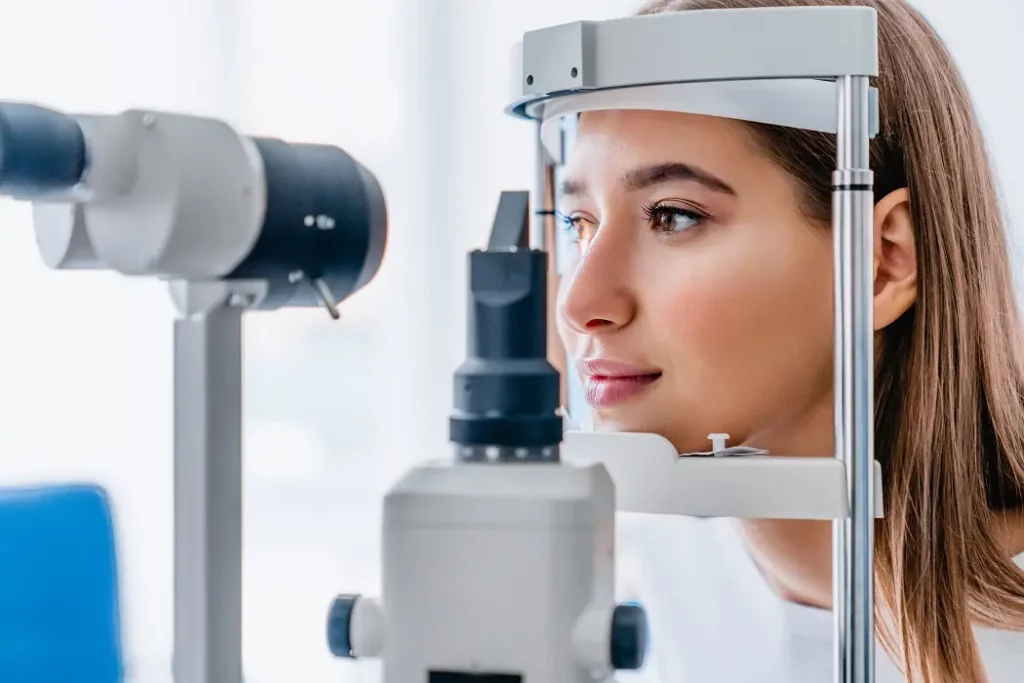

The refractive surgery team at Discover Vision Centers has been at the forefront of treatments for hyperopia for nearly 3 decades. We have been involved in several FDA clinical trials for surgical correction of farsightedness or hyperopia. LASIK eye surgery for farsightedness is FDA-approved.
Farsightedness or hyperopia affects about 20 to 25% of Americans. It affects people of all age ranges and there is some familial component as those with hyperopic parents are more likely to be hyperopic as well. The condition is caused by the eyeball being too short or the front surface of the eye, the cornea, being too flat, or a combination of both. Many children start out hyperopic but as they grow so does the length of their eyeball and the hyperopia will resolve. Many people with hyperopia use prescription eyeglasses or contact lenses to see and function better. Others may choose to have their hyperopia corrected with surgery.
Patients may experience several symptoms when hyperopia is not corrected including:

Farsightedness can occur at any age but after age 40 another type of age-related farsightedness can occur which is called presbyopia. Presbyopia is caused by the loss of flexibility of the crystalline lens of the eye and/or the weakening of the muscles that help control the accommodation power of the lens of the eye to focus from distance to near. When this occurs, it becomes more difficult if not impossible to see objects that are up close without the use of reading glasses.
Presbyopia is an unpreventable part of the natural aging process, and it tends to start around the 40s and progressively gets worse until it stabilizes at age 65.
Early signs of presbyopia include:

LASIK is approved to treat farsightedness with or without astigmatism. At Discover Vision Centers your candidacy for LASIK for hyperopia will be evaluated. Most patients over age 40 with hyperopia are better suited for refractive lens implant surgery as their bigger issue is presbyopia and their needs are better served with refractive lens implant procedures that will last longer and provide a more stable result. LASIK is more often used for very low levels of farsightedness for patients less than age 40.

At Discover Vision Centers LASIK for hyperopia is for a select group of patients. Most patients that are bothered by hyperopia are actually bothered by the inability to read, they are over age 40 and actually suffering from presbyopia. As such they are better candidates for refractive lens replacement surgery with a light-adjustable lens or multifocal lens implant. Patients with extreme or severe hyperopia are best treated with refractive lens replacement and do not undergo LASIK for hyperopia. The reason is LASIK for hyperopia tends to regress much more than LASIK for myopia. Hyperopia treated with refractive lens replacement does not regress, the image quality is exquisite and the treatment is a permanent cure.
Things to consider before you undergo LASIK for hyperopia:

Prior to your LASIK surgery for farsightedness procedure your eye and general health history will be reviewed. A comprehensive eye exam and several computerized tests will be completed to ensure that you are fit for surgery and are an acceptable candidate. If you wear soft contact lenses, you will be asked to stop wearing them a few days before the LASIK surgery. Immediately before your procedure, you will likely be given an oral sedative. You will lie down under the lasers. The surgeon will instill topical anesthetic drops. A femtosecond laser will be used to create the LASIK flap. Then an excimer laser will be used to reshape the underlying surface. This laser will last about 30 seconds. The flap will be replaced. Topical steroids and antibiotic drops will be instilled. You may notice tearing, light sensitivity, and foreign body sensations for 3-4 hours after surgery. You should be able to resume work and regular activities the day after surgery. You should avoid rubbing your eyes.

With modern LASIK about 70% of eyes will achieve 20/20 unaided distance vision and almost 100% will achieve 20/40 unaided distance vision which is legal driving vision. If both eyes of the patient are treated for distance vision after age 40 they should expect to need reading glasses for near and possibly computer usage.
If LASIK is not a treatment option for you, there are other surgical and non-surgical solutions that may be best for you. Non-surgical options include glasses and contact lenses. This could be single-vision or bifocal glasses or contacts. Surgical alternatives to LASIK can include PRK or photorefractive keratectomy which is done with the same laser as used with the LASIK procedure. Another surgical alternative is refractive lens replacement where the crystalline lens or your eye is exchanged for a lens implant that will give your eye the exact power it needs to focus light.
The refractive surgery team at Discover Vision Centers has been at the forefront of treatments for LASIK surgery for farsightedness for nearly 3 decades. We have been involved in several FDA clinical trials for surgical correction of farsightedness or hyperopia with LASIK, Lens Implants, Smile Vision Correction, and Corneal Inlays. LASIK eye surgery for farsightedness has been FDA-approved since 1999 and Discover Vision Centers has been part of the teams from two separate companies to complete certification. Contact us today to find out more.
Yes, astigmatism can be treated at the same time as farsightedness with the LASIK procedure.
This is somewhat of a trick question. A person over age 40 who is farsighted will also have difficulty reading. Their best surgical option may be to undergo a refractive lens replacement that can help them see distance, intermediate, and near without glasses.